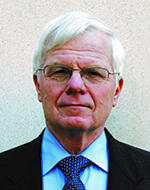News Archive
David Connolly, HPS Congressional Liaison, The Connolly Group
 It is now just over a year since I have physically been in the US Capitol and had a face-to-face meeting with a senator, member of the House of Representatives, or any of their staff persons, and this lack of normal contact is beginning to affect me. From my vantage point, the best way to represent the Society with the Congress is to be walking around the Capitol complex attending meetings, running into people, monitoring hearings, and listening to some of the floor debates. Although I can do some of those things through the internet, the lack of both the physical interaction and the depth of knowledge obtained from these interactions makes me feel somewhat inadequate in trying to perform my duties. Notwithstanding this COVID-19 reality of the last year and my misgivings, there have been some noteworthy legislative achievements for the Health Physics Society in the last year that I will discuss over the next month.
It is now just over a year since I have physically been in the US Capitol and had a face-to-face meeting with a senator, member of the House of Representatives, or any of their staff persons, and this lack of normal contact is beginning to affect me. From my vantage point, the best way to represent the Society with the Congress is to be walking around the Capitol complex attending meetings, running into people, monitoring hearings, and listening to some of the floor debates. Although I can do some of those things through the internet, the lack of both the physical interaction and the depth of knowledge obtained from these interactions makes me feel somewhat inadequate in trying to perform my duties. Notwithstanding this COVID-19 reality of the last year and my misgivings, there have been some noteworthy legislative achievements for the Health Physics Society in the last year that I will discuss over the next month.
Among the perennial legislative goals of the Government Relations Program is to achieve funding for the study of health physics in universities and colleges throughout the country. One of the main vehicles to do this is the Integrated University Program jointly administered by the Department of Energy and the Nuclear Regulatory Commission. For the past number of years, the funding level for this program has not moved off of the $15 million mark despite our efforts to get it increased. However, in a positive development, the Appropriations Committees recognized the value of the program in their report (which explains why they fund particular programs) with the following language:
Integrated University Program.--The agreement notes the alarming statistics highlighting the severe shortage of highly trained nuclear specialists and the lack of academic programs to train and prepare individuals for work in the nuclear sector. The budget request again attempts to defund this program, despite continued success in developing highly qualified nuclear specialists to meet national needs. The agreement provides $5,000,000* to continue the Integrated University Program, which is critical to ensuring the nation's nuclear science and engineering workforce in future years. [NOTE: the phrase "budget request" used in this quote means the request submitted by the Trump Administration, which the Congress ignored.]
The acknowledgement by the Appropriations Committee of the need for support in academic programs was a very positive step that we will build on in our future advocacy—an advocacy that I hope to be doing in person in the very near future!
*The total appropriation is $15 million drawn from other accounts.




